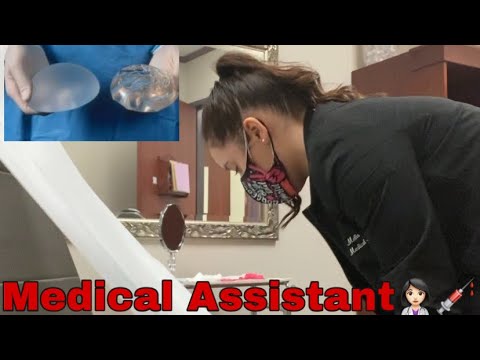Medical Assistants in Cosmetic Surgery
Contents
- What is a medical assistant?
- What is cosmetic surgery?
- The role of Medical Assistants in cosmetic surgery
- The benefits of having a medical assistant in cosmetic surgery
- The training and skills required to be a medical assistant in cosmetic surgery
- The duties of a medical assistant in cosmetic surgery
- The challenges of being a medical assistant in cosmetic surgery
- The future of medical assistants in cosmetic surgery
- FAQs about medical assistants in cosmetic surgery
- How to become a medical assistant in cosmetic surgery
The medical assistant is a key member of thecosmetic surgery team. The medical assistant’s responsibilities vary with the size and type of practice, but may include taking medical histories, helping to prepare patients for surgery, providing postoperative care, and scheduling appointments.
Checkout this video:
What is a medical assistant?
A medical assistant is a healthcare professional who performs administrative and clinical tasks in a medical office. They work under the supervision of a licensed physician or nurse.
Medical assistants are often the first point of contact for patients when they come into a doctor’s office, clinic, or hospital. They may greet patients, answer phones, schedule appointments, and update patient medical records
Clinical duties of Medical assistants include taking and recording vital signs, such as blood pressure and weight, preparing patients for examination, assisting the physician during the exam, and collecting and preparing laboratory specimens. They also may give injections or vaccinations and perform routine laboratory tests.
What is cosmetic surgery?
Cosmetic surgery is a surgical specialty that focuses on improving the appearance of patients. It can involve procedures to correct a variety of conditions, such as birth defects, skin damage from burns or injuries, or the effects of aging.
Medical assistants who specialize in cosmetic surgery provide support to surgeons during procedures and help with postoperative care. They may also provide pre- and postoperative instructions to patients and assist with office duties such as scheduling appointments and handling patient records.
The role of Medical Assistants in cosmetic surgery
Medical assistants play an important role in cosmetic surgery. Before surgery, they prepare patients for their procedures by taking medical histories and performing physical examinations. They also help to educate patients about their options and what to expect before, during, and after surgery.
During surgery, medical assistants help the surgeon by providing instruments and other supplies. They may also hold retractors or suction devices. After surgery, medical assistants help care for patients as they recover. They may apply dressings and give instructions on wound care.
The benefits of having a medical assistant in cosmetic surgery
When considering cosmetic surgery, it is important to choose a qualified and experienced surgeon. But it is also important to consider the team that will be supporting the surgeon during the procedure. A medical assistant who is experienced in assisting with cosmetic surgery can be a valuable asset, providing both practical and emotional support to the patient.
Many medical assistants have experience working in a variety of surgical specialties, so they are familiar with the surgical environment and the procedures involved in cosmetic surgery. They understand how to position patients for surgery, how to monitor vital signs, and how to care for patients before and after surgery. They also know how to deal with any complications that may arise.
In addition to their practical skills, medical assistants who have experience in helping people through cosmetic surgery also have excellent people skills. They understand the anxiety and apprehension that patients may be feeling before surgery, and they know how to provide reassurance and support. They also know how to help people manage pain and other side effects after surgery.
If you are considering having cosmetic surgery, be sure to ask your surgeon about his or her team, including whether a medical assistant will be present during your procedure. Having someone experienced in assisting with cosmetic surgery can make a big difference in your experience of undergoing this type of procedure.
The training and skills required to be a medical assistant in cosmetic surgery
Medical assistants in cosmetic surgery require specialized training and skills. Most programs offering this training are found at technical schools and community colleges. There are also a few hospitals that offer medical assistant training programs specifically for those interested in working in cosmetic surgery.
Medical assistants in cosmetic surgery need to have excellent people skills. They must be able to deal with patients who may be nervous or anxious about their procedures. They also need to be able to handle the demands of a busy surgical schedule.
In addition to people skills, medical assistants in cosmetic surgery need to have good medical knowledge. They should know how to take medical histories, measure vital signs, and perform basic lab tests. They should also be familiar with the types of equipment and supplies used in cosmetic surgery procedures.
The duties of a medical assistant in cosmetic surgery
As a medical assistant in cosmetic surgery, you will have a variety of duties. You will be responsible for preparing patients for surgery, as well as providing post-operative care. You will also be responsible for handling surgical instruments and supplies, and assisting the surgeon during procedures. In some cases, you may also be responsible for scheduling surgeries and managing the surgery schedule.
The challenges of being a medical assistant in cosmetic surgery
While medical assistants play a vital role in supporting cosmetic surgeons, they also face a number of challenges in this field. In addition to the demands of the job, they must also deal with the sometimes intense pressure that comes with working in an environment where people are seeking to improve their appearance.
One of the biggest challenges for medical assistants in cosmetic surgery is keeping up with the latest trends and procedures. As new technologies and techniques are developed, medical assistants need to be able to adapt and learn how to properly use them. Additionally, they must be able to explain these procedures to patients in a way that is both informative and comforting.
Another challenge facing medical assistants in cosmetic surgery is dealing with patients who may be unhappy with their results. It is important for medical assistants to be able to empathize with patients while also being realistic about what can and cannot be achieved through surgery. In some cases, patients may need to be referred to other specialists or experts in order to get the best possible results.
Overall, working as a medical assistant in cosmetic surgery can be both rewarding and challenging. Those who are up for the challenge will find that it can be a very gratifying career.
The future of medical assistants in cosmetic surgery
With the ever-growing popularity of cosmetic surgery, medical assistants are becoming an increasingly important part of the surgical team. Although their role is often behind the scenes, they play a vital role in ensuring the smooth running of any cosmetic surgery procedure.
Medical assistants in cosmetic surgery provide pre- and post-operative care to patients, as well as assisting with surgical procedures themselves. They must be highly skilled and knowledgeable in order to carry out their duties effectively. In addition, they must be able to deal with the unique challenges that come with working in this field.
The future of medical assistants in cosmetic surgery looks bright. As the demand for cosmetic surgery procedures continues to grow, so too will the need for skilled and experienced medical assistants. If you are interested in pursuing a career in this field, now is the time to do it. With the right training and experience, you can become an integral part of any cosmetic surgery team.
FAQs about medical assistants in cosmetic surgery
If you’re considering a career in cosmetic surgery, you may be wondering if you need to be a medical assistant. The answer is yes and no. Cosmetic surgeons are doctors who have completed additional training in cosmetic surgery, so they are able to perform both surgeries and non-surgical procedures.
However, many cosmetic surgeons choose to have a medical assistant on staff to help with patient care before and after surgery. Medical assistants can also assist with office administration, scheduling appointments, and patient education. If you’re interested in working in the field of cosmetic surgery, becoming a medical assistant is a great way to get started.
What does a medical assistant do in cosmetic surgery?
A medical assistant in cosmetic surgery is responsible for prepping patients for their procedures, which may include cleaning the surgical area and applying sterile dressings. After the procedure, the medical assistant will help the patient recover by providing post-operative care instructions and monitoring their vital signs. In some cases, the medical assistant may also assist with non-surgical procedures such as Botox injections or laser hair removal.
What education do I need to become a medical assistant?
Most medical assistants have at least a high school diploma, although some choose to pursue further education by completing an accredited medical assisting program. These programs typically take one to two years to complete and include coursework in anatomy, physiology, and medical office procedures. Many states also require medical assistants to be certified by passing an exam such as the Certified Medical Assistant Exam (CMAE) or the Registered Medical Assistant Exam (RMA).
How much does a medical assistant make in cosmetic surgery?
According to salary data from PayScale.com, the average annual salary for a medical assistant working in cosmetic surgery is $32,660. However, salaries can vary depending on experience, location, and employer.
How to become a medical assistant in cosmetic surgery
A medical assistant in cosmetic surgery is a medical professional who supports the work of surgeons and other medical personnel during cosmetic surgery procedures. Assistants typically have a background in either medicine or nursing, and many have experience working in a surgical setting.
In order to become a medical assistant in cosmetic surgery, you will need to complete an accredited training program and obtain a license from your state’s cosmetology board. Once you have completed these requirements, you will be able to work with patients undergoing cosmetic surgery procedures.







